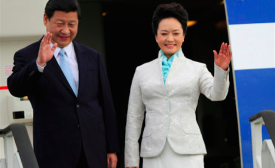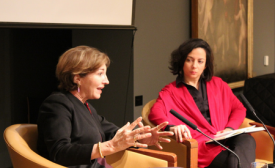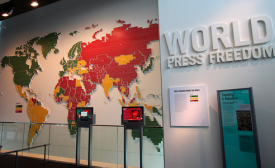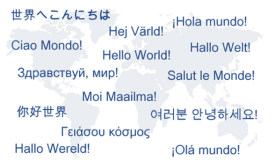government pd
In this video, the U.S. Consulate in Karachi hosted a football clinic for local schoolgirls. Sports diplomacy has become an integral tool in building relationships between the U.S. and other nations. U.S. Consulate General Michael Dodman states, “This program is about two things, the things that bring us together as a culture which is the love of sports and to help improve the skills of the children of Karachi.”
These are exciting days for those of us who teach and practice public diplomacy. Aimed at establishing mutually beneficial relationships between governments (as well as non-governmental organizations) and citizens of foreign nations, our field is viewed as transformative by some, while somewhat idealistic by others.

First ladies have long been an important part of a nation’s public diplomacy. Now their role is ever more pronounced.
Earlier this month, the Department of Defense released the 2014 Quadrennial Defense Review, released every four years to “adapt, reshape, and rebalance [the] military to prepare for the strategic challenges and opportunities” to be faced in the coming years.

The rise of Web 2.0 tools created a new, easy-to-use channel for diplomats and public diplomacy bureaus to reach far-flung publics. Many foreign ministries adopted the new technology almost immediately, creating a field called public diplomacy 2.0. New problems appeared quickly though. Social media’s all-in participation creates an environment where messages cannot be controlled as they are framed and re-framed by the twittering masses.

Among the principal assets of U.S. public diplomacy are American values. They are admired around the world, even by many people who dislike American policy. No other political system offers such extensive individual and systemic freedoms as those enumerated in the Bill of Rights. Showcasing and standing up for those freedoms should be at the heart of U.S. public diplomacy.
Anti-drugs police in the Dominican Republic have revealed how a micro-trafficking network paid local cops over $100,000 in bribes each month, showing how the domestic drug market is spawning ever wealthier and powerful local organized crime groups.

“Treknie gadi (the fat years) – tas jums tiešām ir jāzina (that one you really have to know),” said the Latvian teacher, and, for the next two hours, our language class dissected those two words. We read in Latvian about Prime Minister Aigars Kalvītis and his famous 2005 speech to the nation promising a modern incarnation of Jacob’s biblical prophecy of seven ‘fat years’ of prosperity followed by seven years of hardship. We learned pārpalikums (surplus) and dižkibele (global financial crisis).







